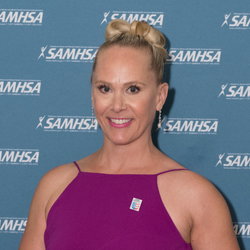 https://www.soberrecovery.com/images/og-image.gif
https://www.soberrecovery.com/images/og-image.gif
Recovery Hero of the Week:
Kristina Kaufmann
By SoberRecovery, Staff Writer
 250
250
https://cimg1.ibsrv.net/cimg/www.soberrecovery.com/250x250_85-1/349/Kristina-Kauffmann_03-275349.jpg
250
250
https://cimg1.ibsrv.net/cimg/www.soberrecovery.com/250x250_85-1/349/Kristina-Kauffmann_03-275349.jpg
"Unfortunately, for some soldiers, war doesn’t end on the battlefield. They come home with their issues that affect entire families."
Age: 47
Co-Founder of Code of Support Foundation
Currently living in Alexandria, VA
Kristina Kaufmann is a 2017 SAMHSA Voice Awards Consumer/Peer/Family Leadership award recipient. During her 11 years as a wartime Army wife, Kristy recognized the need for improved mental health support for soldiers and their families. It was an arduous push for change that eventually led to her co-founding Code of Support Foundation, a national nonprofit dedicated to integrating effort in a highly fragmented veteran support community. Today, Kaufmann is considered a subject matter expert on the mental health impacts of war on military families. This year’s Voice Awards program, hosted by Chef Robert Irvine, shined a spotlight on those who give hope and support to service members, veterans and their families who have faced behavioral health challenges.
We are honored to have had the opportunity to speak with Kristina Kaufmann. Below is a transcript of our interview.
What are some things that people don’t necessarily understand about being an army wife?
I think that the thing that most people probably don’t realize is that when the guys know they’re deploying, they’re already kind of gone three months before—mentally—because they’re preparing. Sometimes these deployments are a year and fifteen months but you also have the three or four months train up, and so it is a process that goes far beyond just the deployment. And the way it’s worked for the past fifteen years with the operational tempo, is that as soon as their boots hit the ground, they’re just training for the next deployment.
There’s no precedent for this operational tempo and deploying the same people over and over again. And unfortunately, for some soldiers, war doesn’t end on the battlefield. They come home with their issues that affect entire families, and you have to kind of learn to live with that new reality every time they come back. So I think that’s one of the things people don’t realize. Like, yes you’re happy they’re home, but there’s a lot that comes along with that reunion.
I think one of the mental health challenges that we see with service members is they have that loss of mission and purpose and I think that happens to some of the spouses too. You’re so used to being part of this community, and then you’re out there on your own dealing with the impact of war that it’s had on your service member, and, honestly, your children. People don’t really talk too much about the impact that war has had on children.
At what point did you realize that the system wasn’t working well and that you had to speak up?
It was certainly difficult for us as a couple, but it was really seeing what was going on in the rest of our unit and hearing from the other wives. Typically, this is a pretty strong community; we’re used to taking a lot. But again, once you’re on your third or fourth deployment, it gets a little ridiculous. I mean, honestly—they used to call it our “new normal” and I understand why they had to do that, because it makes you be able to kind of put your head down and get through it, but there’s nothing normal about what was going on. And if you set that bar as your “new normal,” and you don’t feel as the spouse that you can live up to it, then it feels every day like you’re failing.
The analogy I give is, I lift weights, and I can do curls with 5 pounds, 10 pounds—I could probably swing up 20 pounds. But if you put a car on my arm, it’s going to break. And I think that’s the part where I was getting really frustrated. I felt like the Army kept pushing it onto us to be stronger and I’m thinking, “Well, what are you doing? What are you doing to support us and our soldiers in this?” And I felt like they weren’t doing enough.
I felt like they needed to have mental health embedded in the units. I felt like they needed to be funding the family support piece. One of the things I said in the Op-ed that I wrote in 2009 was the way that we’re supporting families in the army is by baking cupcakes and selling them to our own husbands in the military. I mean, when you say it out loud it’s crazy, but that’s exactly what we were doing. So I kind of put myself out there and understood that there was going to be some repercussions to that. What was really concerning to me was not so much the repercussions that it would have on me, but it was the risk to my husband’s career. And so we really had to talk about that and what that was going to mean and we went ahead and went forward anyway. So I have to give him a lot of credit—we’re divorced now—but I have to give him a lot of credit for being able to support me in it because I don’t think I could have done it as effectively if he had not been behind me.
Were the soldiers happy that you were speaking out?
Everybody who I was speaking for, which was mostly the younger folks and the enlisted folks that were doing most of the work in the military were saying, “Good on you. Thanks for having the courage or whatever.” The only real pushback I got, especially after the op-ed, was from more senior spouses and senior leaders. And they didn’t disagree with what I said, which was interesting, because it is what it is—this is what’s going on—they just disagreed with the fact that I said it in the Washington Post. So that it was more of, we should keep this in-house. And my whole point has been, since this is not a military problem, everybody needs to get involved in this.
I had one high-ranking officer tell me at one point, “When you talk about these things it looks like we can’t take care of our own.” And I said to him, “Are we not Americans? I mean, what do you mean?” And clearly, we can’t. I mean, the cat’s out of the bag here. You’re seeing the suicide rates go up, and so I think that the people who I was speaking for were supportive and I think some of the leadership weren’t as comfortable then.
I will say they’ve come a long way. Military leadership has come a long way in recognizing the impact not just on the soldiers but the family members. And one of the things that I really advocated for is making sure that not only are we getting the support, but we’re counting and we’re tracking suicidal attempts and ideations amongst spouses and children. Nobody has that number. And people can’t really do anything that you don’t have numbers for. So we really want to make sure that we have understanding.
A couple years ago, we helped pay for a funeral for a 13-year-old boy, whose father 4 years earlier—he was veteran—shot himself in the head in front of the PTSD clinic that he wasn’t getting help at. Four years later, almost to the day, the kid, wearing his dad’s dog tags, did the same thing. So we know that this goes far beyond one soldier or one marine. This impacts everybody. And unless we track that kind of thing, it’s going to be really hard to get solutions around it.
As Co-founder and Executive Director of Code of Support Foundation, what are some of the key things that you’ve been a part of?
I started the organization with Major General Salisbury because we thought that the biggest problem in this space wasn’t so much the lack of resources—there’s always some gaps; mental health is a gap in this country, not just for the military—but it was fragmentation of effort. So we created Code of Support Foundation to do that—to integrate effort.
So I have a team of people who work directly with the population of crisis across the country. They assess what’s going on with the situation, prioritize and go out into the sea of organizations and agencies and start pulling mental health, legal, benefits, employment—because people don’t come in pretty boxes. And it’s never just mental health—there’s all of those things involved.
We also do a really holistic approach and include the family members, because as I said in my experience when a veteran is having an issue, their family is having an issue. So we make sure that we’re looking at the spouse and the children. Can we get them equine therapy? What can we do for the entire family? And I think that’s one of the things we’re most proud of is that most organizations are very myopically scoped—which they have to be—they have to do mental health, they do education or employment, but there’s really no national organization that’s looking at it holistically and then using and leveraging all of these different resources to cover down and bring someone from a crisis state to sustaining to thriving. That’s the arc that we try to get them to. And sometimes that takes a month and sometimes it takes a year. So we’re really adamant about sticking with our clients throughout the whole thing.
Then we created a technology platform that facilitates that and we’re giving it to organizations and agencies across the country. It’s called PATRIOTlink and basically what it allows providers to do is say, you’re a mental health provider and you’re giving the best mental health treatment ever, but you realize that your veteran is about to be evicted and going through a divorce. Unless you find him or her resources to deal with those things, good luck with the mental health piece of it. So we think by using Patriot Link and giving that capability to everybody working with veterans, we will really truly create a one-stop shop and everybody will be able to find the resources that veterans need, whether or not they provide them.
So during the last six years of Code of Support’s operation, what has been the most prevalent need that’s you’ve observed?
We have our top four or five needs. Mental health is always up there. Financial, financial counseling, legal help, guidance on benefits with the VA, and employment, but I think that one of the trends that we have seen is that when people first get out of the military, they tend to do okay for a couple of years. A lot of the things that come up, particularly mental health-wise, lag and might pop up 2 years, 5 years, or 8 years after the actual service.
I think that’s one of the hardest things in our industry, in general. We want to try to get to people before they’re in a crisis. So we’re working with the Department of Defense in trying to get PATRIOTlink kind of upstreamed into the process as they transition out so that we can get people connected to resources before they’re really in trouble.
This is beyond just the military, but I think even as people we tend to be suppressors.
I think that’s true. When you’re in it and when you’re going through the deployments and you’re working it all, you just kind of do it. And all of a sudden, you look up and you’re like, “Shit. Where am I right now?” You got your nose down so long to focus on the mission, get it done, get it done, that when you’re finally able to pick your head up and take a breath, it hits you. It hits you like a truck.
That’s where we can work on the preventative side of having people understand that this is an abnormal situation that you’re in, and there are things that we can do to support you or you can do to support yourself. And also being able to say, as a spouse, “This is really hard and it’s really hurting me” because spouses are the ones that hold the line. So if we go down, everybody else is going to go down—that’s the way we feel.
And so we need to make sure that we’re giving them every resource, every support throughout that journey and recognizing that sometimes they’ll be doing great and sometimes they won’t and being able to continue to provide the resources that that person’s going to need. And the space for them to say, “This sucks” and not feel bad about it and not feel like you’re failing or that you’re not a strong wife because you think this is hard.
So any thoughts, expectations or emotions about the Voice Awards?
I’m going back and forth in my head about how I feel. I’m here because I spoke up—and I’m proud that I did that and the impact that it continues to have—but I also think about the friends that I’ve lost to suicide and combat, and so it feels a little weird in some respects of getting an award for that, but I think that they would be cheering me on so that makes me feel better.
Would you like to be featured in our Recovery Hero of the Week series? Send in your story (500–1000 words) to [email protected] and you might just be selected as our next featured hero. Thank you for spreading the message!






